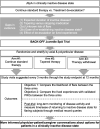Biologic Abatement and Capturing Kids' Outcomes and Flare Frequency in Juvenile Spondyloarthritis (BACK-OFF JSpA): study protocol for a randomized pragmatic trial
- PMID: 36755328
- PMCID: PMC9906941
- DOI: 10.1186/s13063-022-07038-6
Biologic Abatement and Capturing Kids' Outcomes and Flare Frequency in Juvenile Spondyloarthritis (BACK-OFF JSpA): study protocol for a randomized pragmatic trial
Abstract
Background: The effectiveness of biologic therapies, primarily tumor necrosis factor inhibitors (TNFi), for children with spondyloarthritis (SpA) has made inactive disease a realistic patient outcome. However, biologic therapies are costly, primarily delivered by subcutaneous or intravenous route, and have non-trivial side effects. Many patients and families want to know if biologic medications can be discontinued after inactive disease is achieved. It remains unclear whether medication dose should remain unchanged, tapered (increase the time between doses), or discontinued once when inactive disease is attained.
Methods: The Biologic Abatement and Capturing Kids' Outcomes and Flare Frequency in Juvenile SpA (BACK-OFF JSpA) trial is a multicenter pragmatic trial that will randomize 198 participants ages 8-21 years old with SpA and sustained inactive disease on standard TNFi dosing to (1) continue standard TNFi dosing, (2) fixed longer dosing intervals of TNFi, or (3) stop TNFi. The trial will compare the hazard rate of protocol-defined flare and participants' emotional health among the 3 groups over 12 months. Innovative aspects of this trial are the involvement of patient and parent stakeholders in the design and conduct of the study as well as an electronic health record-based enhanced recruitment strategy.
Discussion: This is the first randomized pragmatic trial to assess the efficacy of TNFi de-escalation strategies in children with JSpA with sustained inactive disease. This research will improve the evidence base that patients, caregivers, and rheumatologists use to make shared decisions about continued treatment versus de-escalation of TNFi therapy in this population.
Trial registration: ClinicalTrials.gov NCT04891640. Registered on 18 May 2021.
Keywords: Biologic; Electronic Health Records; Patient-reported outcome; Pediatrics; Randomized pragmatic trial; Spondyloarthritis.
© 2023. The Author(s).
Conflict of interest statement
Drs. Weiss and Lovell consult for pharmaceutical companies but this consulting work is not related to the PCORI-funded project.
Dr. Weiss: Lily, Biogen, Pfizer, Inc., and Novartis
Dr. Lovel: United BioSource Corporation, Hoffman-LaRoche, Inc., Janssen Research & Development, LLC, Bristol -Myers Squibb, AstraZeneca, Pfizer, Inc., AbbVie Inc., GlaxoSmithKline, Novartis Pharmaceuticals, Abbott Laboratories, and Roche Laboratories, Inc.
Figures
References
-
- Rosenberg AM, Petty RE, Oen KG, Schroeder ML. Rheumatic diseases in Western Canadian Indian children. J Rheumatol. 1982;9(4):589–592. - PubMed
-
- Oen K, Schroeder M, Jacobson K, et al. Juvenile rheumatoid arthritis in a Canadian First Nations (aboriginal) population: onset subtypes and HLA associations. J Rheumatol. 1998;25(4):783–790. - PubMed
-
- Ravelli A, Consolaro A, Horneff G, et al. Treating juvenile idiopathic arthritis to target: recommendations of an international task force. Ann Rheum Dis. 2018;77(6):819–828. - PubMed
Publication types
MeSH terms
Substances
Associated data
Grants and funding
LinkOut - more resources
Full Text Sources
Medical



